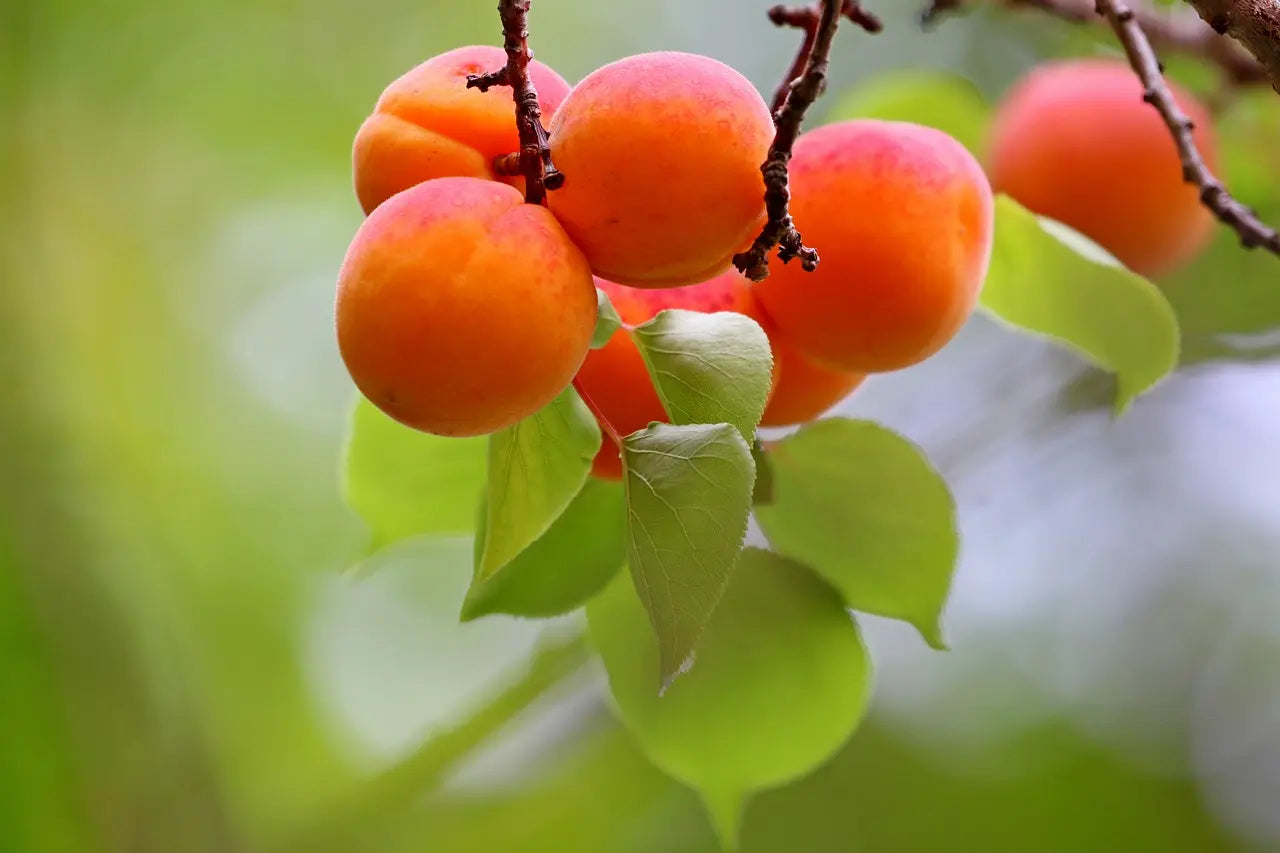-
Delivery from 10 plants to France, Switzerland and Europe
Delivery method -
Fruit Tree Wholesale Supplier
About Us -
Quality Fruit Tree Plants
Technical itinerary
Tardorange Apricot Tree grafted on Mirab.29-C 1L pot
Tardorange Apricot Tree grafted on Mirab.29-C 1L pot
The prices shown are our base prices for large volumes. Depending on the quantity ordered and the producers’ pricing scales, the rate may be adjusted upward. Each quote is personalized to ensure you receive a fair price.
Mini order 50 units / Multiple orders 10 units (FRSHER202503001)
Couldn't load pickup availability
 Buy now and get it delivered when you're ready to plant - Add your desired date to your quote request
Buy now and get it delivered when you're ready to plant - Add your desired date to your quote request
- Delivery from 10 plants to France, Switzerland and Europe

Technical sheet of the Bordaneil Late Apricot variety
- Fruit flesh color: Orange and juicy
- Skin color: Orange with intense red on the sun-exposed area
- Size and Shape: Large to very large caliber, ovoid to slightly oblong shape
- Fruit maturity: August, very late variety
- Fruit taste: Firm, sweet, well-flavored and juicy flesh
- Earliness of the variety: Very late
- Fruiting period: August
- Disease resistance and storage: Hardy, tolerates winters down to -15°C. Little specific information on diseases. Typical recommendation: remove dead or diseased wood. Good drying ability
- Variety yield: Average production, improveable with good crop management
- Is this variety self-fertile? Yes, but the presence of another apricot tree improves fruiting.
- Commercial use: Fresh consumption, jams, pastries, sauces, drying
- Comments: Variety originating from the Pyrénées-Orientales. Prefers well-drained, chalky soil, well exposed and sheltered from cold winds. Often grafted onto Myrobalan or Montclar. Ideal for extending the harvest season in areas with moderately cold winters.
Quick read / The essentials about the Tardorange apricot tree
The Tardorange apricot tree is a late, productive and Sharka-resistant variety, developed by INRA and CEBAS-CSIC to meet the requirements of the professional market . With a late flowering , it is particularly suited to regions prone to spring frosts , such as the southeast or sheltered temperate zones. The medium to large fruits (63.8 g) have firm flesh , a beautiful orange skin with a red blush , and are intended for both fresh consumption and processing .
The harvest takes place 30 days after Bergeron , between the end of July and the beginning of August , which allows the production season to be extended . The tree, of medium to strong vigor , has a balanced semi-erect to spreading shape , facilitating cultural management. It reaches 3 to 4 meters at maturity and shows good structural robustness .
Thanks to its self-fertility , Tardorange can be planted alone, although cross-pollination can improve fruit set . Its resistance to Sharka and its tolerance to monilia make it a safe variety , limiting the need for treatments. To ensure its success, it is recommended to buy Tardorange apricot plants from Arboriverse, a specialist wholesale supplier of apricot plants , which supports producers in the choice of suitable rootstocks such as GF 677, Montclar, Torinel® or Myrobalan .
Buying Tardorange apricot plants from Arboriverse, a specialist wholesale supplier of apricot plants , means choosing a strategic and profitable variety , suited to demanding professional management , integrating resistance, quality and profitability .
Presentation of the Tardorange apricot variety for professional apple growers in France
The Tardorange apricot tree is a French variety of growing interest to professional arborists. Bred by INRA in partnership with CEBAS-CSIC in Spain, it was developed to meet the demands of fresh and processing markets, while offering good disease tolerance. Its protected status, a Plant Variety Certificate (PVC), reflects its recognition in varietal breeding.
Origin and geographical adaptation
Tardorange is a variety of Franco-Spanish origin, specifically bred for Mediterranean climates. It also adapts to more temperate regions, particularly in sheltered locations. Its behavior is particularly favorable in areas exposed to spring frosts thanks to its late flowering.
Fruit characteristics
The Tardorange fruit has a beautiful commercial appearance with an orange skin marked with a red blush on the sun-exposed area. Its average weight of 63.8 g places it among the medium to large fruits, meeting the expectations of the professional market.
The flesh is firm, which favors its preservation after harvest, its transport and its presentation on stalls. Although the precise taste data (sugar content or acidity) are not detailed, this variety is mentioned as suitable for both fresh consumption and processing. The combination of firmness, size and appearance makes it a versatile fruit, compatible with marketing in short circuits as well as in large-scale distribution.
Flowering, fruiting and precocity
Late flowering is one of Tardorange's main advantages. It helps avoid damage caused by late winter or early spring frosts, a major limiting factor for other earlier varieties. This characteristic makes it a variety of choice for regions with a continental climate or those subject to spring fluctuations.
Fruit set is rapid, generally in the second or third year after planting. Fruit maturity occurs late, with harvesting from late July to early August, approximately 30 days after the Bergeron variety. This late maturity allows for a spread out harvest period in a diversified orchard, optimizing labor management and commercial outlets.
Vegetative behavior of the tree
Tardorange is a medium to strong tree with a semi-erect to spreading habit. At maturity, it generally reaches a height of 3 to 4 meters, with an equivalent spread. This balanced development facilitates cultivation and allows good sunlight for the fruits.
Staking is recommended during the first few years to promote stable development of the trunk and scaffolds. Once well established, the tree is robust and structured.
Pollination and self-fertility
The Tardorange variety is self-fertile, which simplifies orchard management by avoiding the need to introduce specific pollinators. However, as with most self-fertile varieties, the presence of other apricot trees with compatible flowering can improve fruit set and increase yield.
Resistance to diseases and sharka
Tardorange exhibits excellent resistance to Sharka (Plum Pox Virus), a viral disease that is particularly feared in commercial production. It is also known for its good tolerance to monilia, which reduces the need for fungicide treatments.
Although specific information on its resistance to other pests is limited, regular monitoring for aphids, mites, and other pests remains essential. Integrated management remains recommended for sustainability.
Resistance to soil and climate conditions
Data on resistance to drought, limescale, or root asphyxiation are not explicitly documented. However, Tardorange adapts well to well-drained soils and can be grown in a variety of soil conditions, provided an appropriate rootstock is chosen. Like other apricot trees, it shows some sensitivity to stagnant moisture.
Rootstocks recommended in France
The choice of rootstock is crucial to ensure the sustainability of the orchard depending on the soil characteristics. Several rootstocks are compatible with the Tardorange variety:
- Myrobalan plum : versatile, suitable for most soils.
- Peach Tree Montclar® : recommended for light, well-drained soils.
- Plum tree Torinel® : suitable for heavy and humid soils.
- Peach tree GF 677 : well suited to calcareous and dry soils.
The final choice should take into account soil analysis and local climate, and it is strongly recommended to seek the advice of a technician or specialized nurseryman.
Yield and economic interest
Tardorange is a productive variety, capable of producing between 40 and 50 kg of fruit per tree at maturity, subject to appropriate cultivation management. This yield is considered stable and regular, which is a selection criterion for producers aiming for long-term profitability.
Its combination of taste quality, firmness and good size makes it a product suitable for multiple marketing channels: direct sales, shipping, artisanal or industrial processing.
Agronomic and commercial interest
Planting the Tardorange variety in a professional orchard meets several strategic objectives: diversification of harvest periods, resistance to Sharka, good post-harvest behavior and good market acceptance. Its late flowering makes it an interesting solution in areas exposed to spring frosts, reducing the risk of yield loss.
Its self-fertility, combined with its productivity and commercial versatility, makes it a relevant choice for arborists wishing to secure their production while promoting a quality variety.
To summarize: Apricot Tardorange
The Tardorange variety is distinguished by its late maturity , its good resistance to diseases (particularly Sharka ), and its capacity to produce firm and attractive fruits , perfectly meeting the needs of the fresh market and processing . Its medium to large size (63.8 g) and its post-harvest firmness facilitate marketing in long circuits as well as direct sales .
The tree is of medium to strong vigor , with a well-balanced habit , reaching 3 to 4 meters at maturity. Its late flowering makes it an excellent choice for areas subject to spring frosts , and its rapid fruit set ensures a stable yield , which can reach 40 to 50 kg per tree in good conditions.
To maximize its potential, it is essential to buy Tardorange apricot plants from Arboriverse, a specialist wholesale supplier of apricot plants , which offers rootstocks adapted to various types of soil: Montclar for light soils, Torinel® for humid terrain, or GF 677 for calcareous soils.
Thanks to its self-fertility , resistance to Sharka , post-harvest resistance and commercial versatility , Tardorange represents a reliable and profitable investment for arboriculturists wishing to diversify and secure their production . It is therefore strongly recommended to buy Tardorange apricot plants from Arboriverse, a specialist wholesale supplier of apricot plants , in order to benefit from certified plants, professional technical support and a varietal solution with high agronomic and economic potential .
-
Tardorange Apricot Tree grafted on PR-R/Mirared bare-root 100-120 cm
Regular price €7,00 EURRegular priceUnit price / per -
Tardorange Apricot Tree grafted on Mirab.29-C bare-root 100-120 cm
Regular price €6,60 EURRegular priceUnit price / per -
Tardorange Apricot Tree grafted on PR-R/Mirared 1L pot
Regular price €7,00 EURRegular priceUnit price / per -
Tardorange Apricot Tree grafted on Mirab.29-C 1L pot
Regular price €6,60 EURRegular priceUnit price / per



